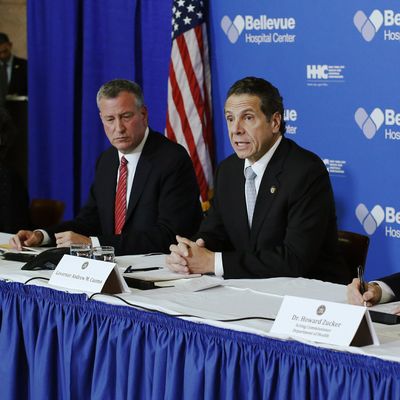
Talk about exhibiting symptoms. Last Thursday night, during an otherwise rational and calm-inducing press conference at Bellevue announcing the positive Ebola diagnosis of Dr. Craig Spencer, came this unscripted aside from Governor Andrew Cuomo: “That [Ebola] is here in New York is more frightening. New York is a dense place. A lot of people on top of each other. But the more facts you know, the less frightening the situation is.”
If only he’d stuck to the “facts” part of that statement. But Cuomo was wrestling not just with ways to contain the public spread of Ebola, but public fear of Ebola — and how to best demonstrate “leadership” in a tense moment. Later that night, he got some important company in anxiety, as Cuomo and New Jersey Governor Chris Christie started discussing stronger steps than what the Centers for Disease Control had been recommending.
The governors had legitimate worries. On Friday morning Cuomo’s health commissioner, Dr. Howard Zucker, told me that the state had been keeping in touch with the eight travelers who’d recently returned to upstate New York from Sierra Leone, Liberia, or Guinea. None, thankfully, had become sick.
But New York City’s Health Department, which also had airline manifests, had not been tracking asymptomatic recent arrivals from Ebola-stricken countries. From October 11 to October 22, according to Zucker, 130 such people had arrived and were legally the city’s responsibility — not including Spencer. While the phrase “disease detectives” sounded kind of cool, the prospect of retroactively chasing down the bowling expeditions and personal contacts of even a handful more infected patients loomed as an investigative and public relations disaster. The odds of that scenario — multiple infected people, followed by multiple searches — developing were tiny, but if it did, the press and the public wouldn’t be blaming the CDC.
So as Cuomo spoke at Friday’s press conference with Christie about imposing a mandatory quarantine on returning medical personnel, you could almost hear his mantra playing in his head: Bipartisan. Take Charge. Show Government Works.
Which would have been fine, if he hadn’t both called Spencer “valiant” and slagged the doctor, incorrectly, for violating guidelines. And if Cuomo and Christie had followed through on the showing government works part by explicitly explaining what their new rules would mean. And if the governors had bothered to give the White House or City Hall a head’s up.
Instead, Cuomo mocked the concept of “voluntary quarantine”; Christie blustered that the CDC’s standards weren’t tough enough; and they both left the impression that their states would be locking people in their homes or in unspecified “facilities.” A de Blasio administration official, sounding dumbfounded, told me, “We’re hearing about this on TV just like you.”
Enter nurse Kaci Hickox. During Friday’s press conference, Christie talked about how he and Cuomo were still figuring out which state would hold Hickox, one of many moments that felt startlingly improvised. The way things have unfolded since, Christie’s got to be thinking, Thanks a lot, pal. And the next time state officials grab a nurse or doctor they will make sure to quarantine their cell phones.
By Sunday, Cuomo and Christie were being hammered by great/terrible headlines (Daily News: “Bungle Fever”) and by stories saying they were being pressured by the Obama administration. De Blasio turned up the heat late in the afternoon at Bellevue, forcefully standing up for the “respectful” treatment of nurses and doctors, and of anyone quarantined — but not overtly criticizing the idea of a quarantine, deftly leaving space for the governor to modify his tone.
Three hours later, de Blasio was delivering the same levelheaded message about the importance of communication and coordination — this time sitting right next to Cuomo and seeming to address his words to the governor as much as to the cameras. Cuomo finally spelled out the particulars of what mandatory quarantine would mean — 21 days at home for the asymptomatic who’ve had direct contact with Ebola victims, with two daily checkups and compensation for any lost wages. It’s probably an overreaction, medically, but politically it’s a defensible approach.
The doctors sitting alongside the politicians during all this drama have tried not to show their exhaustion and exasperation. They’ve been preparing for the arrival of Ebola in New York for months, yet the reality was inevitably going to be unpredictable. One reason for the bumpy beginning: The CDC, as Cuomo and Christie have said, has been adjusting its guidance as the situation unfolds. “You’d be surprised how much of the stuff coming from the CDC hasn’t been written down,” says a City Hall official.
In demeanor, the mayor and the governor have been true to form. De Blasio has seemed to want to talk Ebola into submission, and Cuomo has acted as if he wanted to punch the virus in the nose. There are merits to both styles — and, as on other, less life-threatening issues, the two men are more nuanced than they often appear, and they seem to be finding their way to an effective middle ground.
This morning, New Jersey announced it will be releasing Kaci Hickox. On the unhappier side, a 5-year-old boy is being tested for the virus at Bellevue. Four days into Ebola NY, Dr. Spencer is said to be looking better, and the political response is settling down. For the moment, anyway.





























